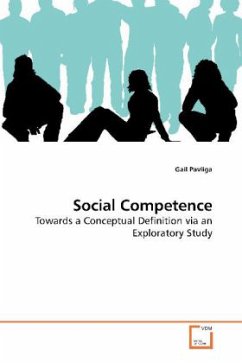Helping individuals with significant behavioral and social problems achieve social competence remains an elusive goal. It may be that researchers have not been able to achieve more favorable outcomes from social competence research because there is not a complete picture of the components and how, if indeed, they interrelate. Until research provides an organized way of looking at the problem, knowledge in the area of social competence is likely to remain fragmented. Developing a conceptual framework for the study of social competence holds promise for fitting fragmented research into a more coherent whole picture. Interventions aimed at improving social competence necessarily begin by conceptually defining the construct. The presence or absence of specific social or behavioral skills may provide the evidence other individuals, such as parents; teachers and peers use to make judgments about social competence. This study had as the primary goal to unify researchers in the development of a conceptual definition of social competence.
Bitte wählen Sie Ihr Anliegen aus.
Rechnungen
Retourenschein anfordern
Bestellstatus
Storno








